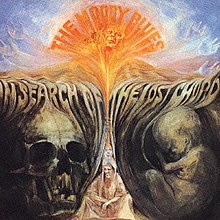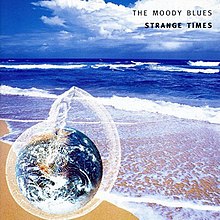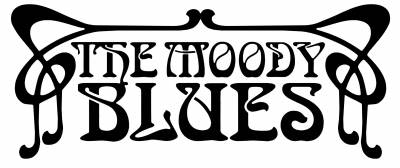|
| 1 |
| 2 |
| 3 |
| 4 |
| 5 |
| 6 |
| 7 |
| 8 |
| 9 |
| 10 |
| 11 |
| 12 |
| 13 |
| 14 |
| 15 |
| 16 |
| 17 |
| 18 |
| 19 |
| 20 |
|
|
NIGHTS IN WHITE SATIN
|
Justin Hayward
|
1967
|
2
|
|
[Q]
Justin Hayward: "I wrote our most famous song, 'Nights in White Satin' when I was 19. It was a series of random thoughts and was quite autobiographical. It was a very emotional time as I was at the end of one big love affair and the start of another. A lot of that came out in the song." (2008:Daily Express Saturday)
Justin Hayward: "I just sat down at home one night, I was at the end of a big love affair and the beginning of a new one, that I knew was really going to be stronger even, and my girlfriend had given me some white satin sheets for the bed -- very impractical, by the way, if you've got any beard growth -- and that was the essence of it.
I just sat down at the edge of the bed with my big 12-string and wrote the song in like four minutes. I think there's a lot of truth in it. There was a line 'letters are written never meaning to send' and I don't know why I wrote that line, but afterwards, years later, I found that I was doing that kind of cathartic process of writing letters to people, putting down my thoughts about problems and looking at them the next day. And there's another line 'just what you want to be you will be in the end' and I think that's true, too. People do become what they want to be, whether that's what they mean or not." (1999:Post-Gazette)
Justin Hayward: "We were writing and preparing a stage show that was going to be a story about a day in the life of a guy that we used to call the 'Moody Blue.'...I wrote 'Nights' as the song that would represent the 'night' part of our stage show, and a lot of personal things went ino it. Again, it was kind of a risky song, insofar that if you lay your heart bare and leave yourself open, you're game for some incredible criticism; somebody's going to punch you. But ultimately, I think that's what people liked about it." (Billboard Book of #2 Singles)
**KILL ME**
[P]
(Justin Hayward)
Justin Hayward – lead vocals, acoustic guitar
John Lodge – bass, backing vocals
Graeme Edge – drums, backing vocals, percussion
Ray Thomas – flute, backing vocals
Mike Pinder – Mellotron, backing vocals, narration (on "Late Lament"), gong
Peter Knight – orchestral arrangements
London Festival Orchestra – orchestral arrangements
Produced: Tony Clarke
Engineered: Derek Varnals
Recorded at: Decca Studios, London, Englan, Oct 8 1967
**KILL ME**
|
|
THE VOICE
|
Justin Hayward
|
1981
|
15
|
|
[Q]
Justin Hayward: "It was the first thing that we recorded for Long Distance Voyager. I used to feel a lot of guilt about our position in the world and that we were really privileged and that went into that song. Long Distance Voyager was a huge milestone for us. There have been a few: Long Distance Voyager and The Other Side of Life were massive. " (2013:Classic Rock Revisited)
Justin Hayward: " It was the first thing that we recorded for Long Distance Voyager. I used to feel a lot of guilt about our position in the world and that we were really privileged and that went into that song. " (2013:Classic Rock Revisited)
Justin Hayward: " I didn't have a title until the day of the mastering. It was called "Fat Arthur" for years because the engineer when we recorded it said, "What's this song called?" and I said, "Oh, I'll think of that after." He said, "OK, 'Fat Arthur.'" He misheard what I said.
So, on the tape box it says "Fat Arthur" and if you look at the scroll in the center of the original pressing it'll say "Fat Arthur" because I could not think of a title. I took it with the engineer, Greg [Jackman], all the way to the mastering suite, which I think was at Sterling Sound in New York. We went to Sterling and did it, and Greg said, "Come on, you've got to give it a title now because this is the mastering. Tomorrow we have to give it to the label." So, I just went through every word in the song and I just chose one." (2016:Songfacts)
John Lodge: "We never thought Gemini Dream would be a big single for us. Come to think of it, The Voice never stood out for us either. Those choices were left to the label. They understood that sort of thing better than us." (2014:Team Rock)
**KILL ME**
[P]
(Justin Hayward)
Justin Hayward: lead vocals, electric and acoustic guitars
John Lodge: bass guitar, backing vocals
Graeme Edge: drums, timpani
Ray Thomas: tambourine, backing vocals
Patrick Moraz: piano, mellotron, Oberheim Custom double 8-voice synthesizer, Yamaha CS80, Roland Jupiter 8, Minimoog
Produced: Pip Williams
Engineered: Greg Jackman
Recorded at: Threshold Studios & RAK Studios, 19 Feb 1980-mid Apr 1981
**KILL ME**
|
|
YOUR WILDEST DREAMS
|
Justin Hayward
|
1985
|
9
|
|
[Q]
Justin Hayward: "And I found with "Wildest Dreams" that it was a common experience for a lot of people. I never thought this; I thought I was writing a frivolous sort of song. Certainly with "Wildest Dreams." Not with "I Know You're Out There Somewhere," because I knew by then. But I thought "Wildest Dreams" would be a throwaway thing that people wouldn't really take much notice of lyrically. But I found out that it was a common experience and desire by a lot of people. So that was very revealing. ..... about at least one particular person. I wouldn't say it was all about one person, but at least one particular person. And my advice to anybody who wants to go back is that you can never go home. And best to leave the past as the past." (2013:Songfacts)
**KILL ME**
[I]
The lyrics of "Your Wildest Dreams" tell the story of a man who is remembering his first love, and wonders if she remembers him the way he remembers her. "Your Wildest Dreams" was followed up by a sequel in 1988. (Wikipedia)
**KILL ME**
(Justin Hayward)
Justin Hayward - acoustic guitar, vocals
John Lodge - bass guitar
Graeme Edge - drums, percussion
Patrick Moraz - keyboards
Produced: Tony Visconti
Engineered: Gordon Futter, Sam Smith, Andy Liewellyn
Recorded at: Good Earth Studios, Soho, London, England
**KILL ME**
|
|
I'M JUST A SINGER (In a Rock and Roll Band)
|
Lodge, Heyward, Pinder, Thomas
|
1973
|
12
|
|
[I]
This was bassist's John Lodge's song about how, at the time, people seemed to look to Rock Stars for answers to the world's problems, and his response is contained in this song: he had no answers. (Songfacts)
**KILL ME**
(John Lodge)
Justin Hayward: vocals, electric guitar
John Lodge: vocals, bass guitar
Mike Pinder: vocals, chamberlin
Graeme Edge: drums, percussion
Ray Thomas: vocals, tambourine
Produced: Tony Clarke
Engineered: Derek Varnals
Recorded at: Decca Tollington Park Studios, London, England
**KILL ME**
|
|
GEMINI DREAM
|
J. Hayward, J. Lodge
|
1981
|
12
|
|
[Q]
John Lodge: "Gemini Dream was originally called Touring The USA. It was the first song we recorded for the album, and it was written after we’d spent 18 months on the road in America. It was about the way you become two different people when you’re in a high-profile band. There’s the person onstage, and then there’s the private version of you.
We never thought Gemini Dream would be a big single for us. Come to think of it, The Voice never stood out for us either. Those choices were left to the label. They understood that sort of thing better than us." (2014:Team Rock)
**KILL ME**
[P]
(Justin Hayward, John Lodge)
Justin Hayward – lead vocals, electric guitars
John Lodge – lead vocals, bass guitar
Patrick Moraz – Yamaha CS80, Minimoog, Oberheim Custom double 8-voice synthesizer
Graeme Edge – drums, percussion
Ray Thomas – backing vocals
Produced: Pip Williams
Engineered: Greg Jackman
Recorded at: Threshold Studios & RAK Studios, 19 Feb 1980-mid Apr 1981
**KILL ME**
|
|
ISN'T LIFE STRANGE?
|
J. Haywood, J. Lodge
|
1972
|
29
|
|
[Q]
John Lodge: "That song wrote itself, strangely enough. I was with my wife, and a couple of friends, and I have a baby grand piano in my drawing room in my house in England. We were having dinner and I could hear this tune in my head and I excused myself. I went over to the piano and, basically, I wrote the whole song, then and there. It only had one lyric at that time, “Isn’t life strange.” I wrote the music right then and there. I remember going to bed and wondering, “I wonder if I have written that song, or if it was something else? In the morning I am going to go downstairs and play it and see if it stands up.” It did. That next day I sat down and wrote all of the lyrics.
The other thing, which is really interesting about that, and shows how things have changed, is that we did all of our vocals on that song on a Friday night, out of necessity, as we were leaving for a tour of America. We landed in New York and we took the tapes to London Records on a Saturday in New York and it was released as a single the following Friday. That was a different time then. It is unheard of today. It moved fast and it was so unbelievable.
You don’t really (know it connects with people). When you write a song your emotions are sort of standing there naked, really. If you’re truthful to yourself, and I think we found this in the Moodies, if you’re truthful then you do connect with people, because people do have the same, or similar, experiences. They connect with it as long as you’re truthful. " (Classic Rock Revisited)
**KILL ME**
[P]
(John Lodge)
John Lodge – lead vocals, bass guitar, possible acoustic guitar
Justin Hayward – lead vocals, electric guitar
Mike Pinder – Chamberlin, harmonium, backing vocals
Ray Thomas – flute, backing vocals
Graeme Edge – drums, percussion
Produced: Tony Clarke
Engineered: Tony Clarke
Recorded at: Decca Tollington Park Studios, London, England, Feb 14, 1972
**KILL ME**
|
|
QUESTION
|
Justin Hayward
|
1970
|
29
|
|
[Q]
Justin Hayward: "That was a song written under pressure. There was a Moody session set at Decca studios on a Saturday. At midnight that Friday I still didn’t have anything for the session the next day. I had parts of two songs that were in the same key but were vastly different.
About four o’clock in the morning I thought, “Oh shit, all I can do is try to put them together and make them work, somehow.” I took it into the studio the next morning and I played it to the guys and they said, “That’s great!” They never even thought about it being two songs. It got to number one in a lot of the charts. It was number two on the BBC charts. It was really a wonderful time in the UK for us. We got on the Isle of Wight Festival and we went down very well there because that song was all over the charts. There is a lot of social commentary in that song. I was reflecting what was happening in the college circuit that we were playing at the time. " (2013:Classic Rock Revisited)
Justin Hayward: "Well it was a kind of an angry song. It started off as two songs, which is probably quite evident really when you listen to it. Y’know one fast song and one slow song. It literally got to a Friday night and we’d planned to go in to record on Saturday during the day. It was usually down to me to come up with a song, because everybody knew, ‘ah, Justin’ll have a song’ so nobody else bothered. So anyway I knew it was down to me to come up with a song. People were saying during the week, ‘y’know what are we gonna do?’, ‘oh, don’t worry I’ll have something’, but by Friday night I still didn’t have anything. What I had was two songs that I’d been working on. One very fast in that big open C tuning. A real deep C on the bottom. It’s like a kind of Joni Mitchell tuning actually. And a real slow ballad as well. And at about 4 o’clock in the morning I decided to put them together to at least give it some length, and then go through the words and try to give it some momentum through to lengthen in some way. For me it was a natural rhythm, the speed of that rhythm. Ever since I was a little kid playing skiffle. It didn’t seem to be very fast at the time until I heard it back. The record actually has Mike Pinder playing tambourine on the original track which I think glues it together. I just said to Mike Pinder y’know, I want it to go ‘ba-ba’ (describing two note intro - editor). And he had this Mellotron sound of brass and strings combined. And by the time we put the voices on, y’know it was one of the quickest records we’d ever made. No double tracking." (2000:MME3)
**KILL ME**
[I]
Originally, the song itself was also to have been named "A Question of Balance," but was shortened to "Question." The lyrics of the chorus represented Hayward's feelings and attitude toward the Vietnam War. ..... "Question" was recorded in one take, and did not need any overdubbing or double-tracking, making it easier for the Moody Blues to perform live. (Wikipedia)
**KILL ME**
(Justin Hayward)
Justin Hayward: lead vocals, 12-string acoustic guitar
John Lodge: bass, backing vocals
Graeme Edge: drums, percussion
Mike Pinder: Mellotron, backing vocals
Ray Thomas: tambourine, backing vocals
Produced: Tony Clarke
Engineered: ??
Recorded at: Decca Studios, West Hampstead, London, England, Jan 24, 1970
**KILL ME**
|
|
I KNOW YOUR OUT THERE SOMEWHERE
|
Justin Hayward
|
1988
|
30
|
|
[Q]
Justin Hayward: "We were working with Tony Visconti and we did the song “Wildest Dreams.” I assumed when we were making the record that it would be a throwaway song. Even before it came out people were going nuts about that song; it struck a chord with people, emotionally.
A lot of people have had that experience where they want to know what happened to the first person they ever loved. My advice to them is to not find out. My thoughts are that you can never go home; you can never really go back.
I brought the basics of that track in from my little home studio and then we did it properly with Tony. He asked if I had more of that type of stuff and I had. I had a mega version of “Wildest Dreams” when I was working up the original track. “I Know You’re Out There Somewhere” was there. It turned out to be one of the most popular songs that we do with the Moody’s. It is one of the most enjoyable songs for me to play when I am onstage." (2013:Classic Rock Revisited)
Justin Hayward: " It was about somebody in particular. ..... And with "I Know You're Out There Somewhere," yes, they both were about at least one particular person. I wouldn't say it was all about one person, but at least one particular person. And my advice to anybody who wants to go back is that you can never go home. And best to leave the past as the past." (2013:Songfacts)
**KILL ME**
[I]
The song's lyrics continue from the lyrics of "Your Wildest Dreams". The lyrics from "Your Wildest Dreams" tell the story of a man who is remembering his first love, and wonders if she remembers him the way he remembers her. In "I Know You're Out There Somewhere", the man realizes he still loves her, and vows to "return again" to her. (Wikipedia)
**KILL ME**
(Justin Hayward)
Justin Hayward: lead vocals, acoustic guitar, electric guitar
John Lodge: bass guitar
Graeme Edge: drums, percussion
Patrick Moraz: keyboards
Produced: Tony Visconti
Engineered: Tony Visconti, Paul Cartledge, Sam Smith
Recorded at: Good Earth Studios, Soho, London, England
**KILL ME**
|
|
TUESDAY AFTERNOON
|
Justin Hayward
|
1968
|
24
|
|
[Q]
Justin Hayward: "Well, songs are usually about relationships and I think sometimes also it’s about places. I was brought up in the West Country in England and it’s full of ancient sites that are marked by standing stones or strange sort of mystical places. My brother and I, when we were little, we would go to these places and we’d always figure, it’s not because the standing stones are there, it’s because the vibe is really there first. That comes first and then they put the stones there, because there was a tremendous feeling. But I think one of the luckiest for me was I had a little dog called Tuesday in the sixties and we knew that Decca wanted us to make this album about the day in the life of one guy and I went back to where I was born with my little dog Tuesday and sat in a field and I got my guitar out and wrote the song “Tuesday Afternoon.” And that has always stayed in my mind so I have to give my little dog some credit for that one (laughs)." (2016:Glide magazine)
Justin Hayward: "I was a little hung up with doing tempo changes in the middle of songs. If I got bored, in order to open up another door within the song, I wanted to just go to a different type of mood. In fact, “Tuesday Afternoon” was the first time we did that. I knew by then, by the time I had written “Tuesday Afternoon,” that we were going to do this stage show that was based on a day in the life of one guy — even before we recorded the album. I already had “Nights in White Satin,” and we were already starting to learn that and play it. But there was a gap in this story of the day, so I went down to my parents’ house in the west country — and I had a dog called Tuesday, at the time! (Laughs.) Not that the dog is in the song, in any way. I smoked a little joint on the side of a field with a guitar, and that song just came out. Then, as you rightly say, London Records didn’t really want to release “Nights in White Satin,” didn’t think it was very radio friendly. But they loved “Tuesday Afternoon,” so that was the first time anybody had ever heard music from the new Moodies in America." (2012:Something Else)
**KILL ME**
[P]
(Justin Hayward)
Justin Hayward - lead vocals, acoustic guitar
John Lodge - bass, backing vocals
Graeme Edge - drums, percussion
Mike Pinder - mellotron, piano
Ray Thomas - flute
Peter Knight/London Festival Orchestra - orchestral arrangements
Produced: Tony Clarke
Engineered: Derek Varnals
Recorded at: Decca Studios, London, England, Oct 22, 1967
**KILL ME**
|
|
THE OTHER SIDE OF LIFE
|
Justin Hayward
|
1986
|
58
|
|
[P]
(Justin Hayward)
Justin Hayward: lead vocals, acoustic guitar, electric guitar
John Lodge: bass guitar
Graeme Edge: drums, percussion
Patrick Moraz: keyboards
Produced: Tony Visconti
Engineered: Gordon Futter, Sam Smith, Andy Liewellyn
Recorded at: Good Earth Studios, Soho, London, England
**KILL ME**
|
|
SAY IT WITH LOVE
|
Justin Hayward
|
1991
|
(22)
|
|
[P]
(Justin Hayward)
Justin Hayward: lead vocals, electric guitars
John Lodge: bass guitar, vocals
Paul Bliss: keyboards, drum programming
Produced: Christopher Neil
Engineered: ??
Recorded at: London, England
**KILL ME**
|
|
GO NOW
|
Denny Laine
|
1964
|
10
|
|
[Q]
Bessie Banks: "I remember 1963 Kennedy was assassinated; it was announced over the radio. At the time, I was rehearsing in the office of Leiber and Stoller. We called it a day. Everyone was in tears. "Come back next week and we will be ready to record 'Go Now'"; and we did so. I was happy and excited that maybe this time I’ll make it. 'Go Now' was released in January 1964, and right away it was chosen Pick Hit of the Week on W.I.N.S. Radio. That means your record is played for seven days. Four days went by, I was so thrilled. On day five, when I heard the first line, I thought it was me, but all of a sudden, I realized it wasn’t. At the end of the song it was announced, "The Moody Blues singing 'Go Now'." I was too out-done. This was the time of the English Invasion and the end of Bessie Banks’ career, so I thought. America's DJs had stopped promoting American artists."
Denny Laine: "It came in one of these suitcases full of records from America. This guy, James Hamilton, he was a friend of B. Mitchel Reed, who was a DJ, and he would send this stuff across. So I picked that one out especially because Mike Pinder was a piano player. (chuckles) We'd always get the gig where the piano would be out of tune and we'd get the slow handclap because they were waiting to tune the piano… (laughs) Anyway, we did 'Go Now' because it was a song with a piano in it." (Gibson.com)
**KILL ME**
[P]
(Larry Banks, Milton Bennett)
Denny Laine: lead vocals, guitar
Clint Warwick: bass, backing vocals
Mike Pinder: piano, backing vocals
Graeme Edge: drums, backing vocals
Ray Thomas: backing vocals
Produced: Denny Cordell
Engineered: ??
Recorded at: ??
**KILL ME**
|
|
THE STORY IN YOUR EYES
|
Justin Hayward
|
1971
|
23
|
|
[I]
The song was intended to describe the history of music from the beginning of time, and the only three words in the whole piece are "desolation", "creation", and "communication". (Wikipedia)
**KILL ME**
(Justin Hayward)
Justin Hayward – lead vocals, acoustic and electric guitar
John Lodge – bass guitar, backing vocals
Graeme Edge – drums, percussion
Mike Pinder – Mellotron, piano, backing vocals
Ray Thomas – tambourine, backing vocals
Produced: Tony Clarke
Engineered: Derek Varnals
Recorded at: Wessex Sound Studios, London, England, Nov 4, 1970
**KILL ME**
|
|
TALKING OUT OF TURN
|
John Lodge
|
1981
|
65
|
|
[P]
(John Lodge)
John Lodge – lead vocals, 12-string acoustic guitar, bass
Justin Hayward – backing vocals and acoustic & electric guitars
Patrick Moraz – Polymoog, Yamaha CS80, vocoder and Minimoog
Graeme Edge – drums, overdubbed cymbals and Simmons drums
Ray Thomas – backing vocals
Produced: Pip Williams
Engineered: Greg Jackman
Recorded at: Threshold Studios & RAK Studios
**KILL ME**
|
|
SITTING AT THE WHEEL
|
John Lodge
|
1983
|
27
|
|
[I]
In interviews, Lodge has stated that he was listening to "Running On Empty" by Jackson Browne when he wrote "Sitting At The Wheel". (Wikipedia)
**KILL ME**
(John Lodge)
John Lodge – lead vocals, bass guitar
Justin Hayward – guitar, backing vocals
Graeme Edge – drums
Patrick Moraz – keyboards
Ray Thomas – harmonica, flute, backing vocals
Produced: Pip Williams
Engineered: ??
Recorded at: Strawberry Studios, South London, England, 1982
**KILL ME**
|
|
RIDE MY SEE-SAW
|
Lodge, Hayward, Thomas, Pinder
|
1968
|
61
|
|
[P]
(John Lodge)
Produced:
Engineered:
Recorded at:
**KILL ME**
|
|
ENGLISH SUNSET
|
Justin Hayward
|
1999
|
--
|
|
[P]
(Justin Hayward)
Justin Hayward: lead vocals, electric guitar
John Lodge: bass guitar, backing vocals
Graeme Edge: drums, percussion
Ray Thomas: tambourine, backing vocals
Danilo Madonia: keyboards
Produced: The Moody Blues
Engineered: ??
Recorded at: Studio Mulinetti, Recco, Italy
**KILL ME**
|
|
NO MORE LIES
|
Justin Hayward
|
1988
|
(15)
|
|
[P]
(Justin Hayward)
Justin Hayward: lead vocals, acoustic guitar
John Lodge: bass
Graeme Edge: drums, percussion
Patrick Moraz: keyboards
Produced: Tony Visconti
Engineered: Tony Visconti, Paul Cartledge, Sam Smith
Recorded at: Good Earth Studios, Soho, London, England
**KILL ME**
|
|
STEPPIN' ON A SLIDE ZONE
|
John Lodge
|
1978
|
39
|
|
[P]
(John Lodge)
John Lodge – lead vocals, bass guitar
Justin Hayward – electric guitar, backing vocals
Graeme Edge – drums, percussion
Mike Pinder – keyboards, backing vocals
Ray Thomas – flute, backing vocals
Produced: Tony Clarke
Engineered:
Recorded at: The Record Plant, Los Angeles, California, USA
**KILL ME**
|
|
NEVER COMES A DAY
|
Justin Hayward
|
1969
|
91
|
|
[Q]
Justin Hayward: "Mike and I, we went out together and bought, when we could afford it, when we had a few bob, we ran out and bought a couple of nice, but not expensive, Yamaha guitars. The first thing I did on mine was write “Never Comes The Day.” You know the sixties was a very ambitious time in the group but it was a difficult time for me. I was from a different background to the other guys in the group and I was losing people, there was a lot of grief around my life. It was a tough time for me, a time when I should have been enjoying the success we were beginning to have with the group. I think there was a lot of frustration that went into that song as well. I was looking for something, searching and kind of seeking for love as well as some kind of happiness and some kind of enlightenment, I suppose. That’s what the song is about." (2016:Glide magazine)
**KILL ME**
[P]
W
|
|
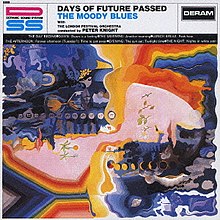
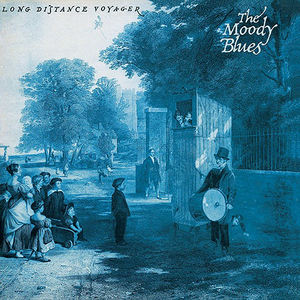
_front_cover.png/220px-The_Moody_Blues_-_The_Other_Side_of_Life_(1986)_front_cover.png)






